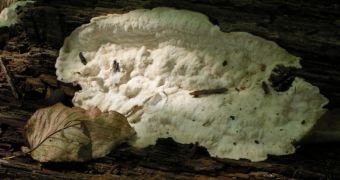
Judging by how much
time and money go into polluting the environment, it comes as good news
that there are still some people who like to take the time to research
ways to clean up natural ecosystems that have somehow become
contaminated.
Interestingly enough, recent news says that, when it
comes to cleaning contaminated soils, us humans might find a worthy
ally in fungi. White rot fungi like the one pictured above, to be more
precise.
Science Daily
tells us that, according to specialist Erika Winquist with the Aalto
University in Finland, this type of fungi has the ability to break down
organic pollutants such as polyaromatic hydrocarbons (PAH compounds) and
dioxins.
Thus, experiments carried out in laboratory
conditions have shown that, when allowed to grow in contaminated soil,
white rot fungi can break down about 96% of the PAH compounds and 64% of
the dioxins it comes into contact with.
The only catch is that, before it can be used to
clean soils contaminated with organic pollutants, the white rot fungi
need be allowed to grow on tree bark for about 4 to 6 weeks. It is only
after this grown period that its mycelia can be placed in polluted soil.
Talking to the press, specialist Erika Winquist
explains that, all things considered, using white rot fungi to clean
contaminated soil would especially come in handy when other options are
either ineffective or too expensive.
Specifically, fungi could serve to remove
contaminants that are resistant to traditional composting, or to avoid
having to burn the soil at high temperatures in large incinerators. More
so seeing how the practice of burning soil to clean it is expensive and
dependent on specific infrastructure.
“Soil polluted with other organic pollutants than
oil accounts for as much as 45 % of excavated contaminated soil. The
compounds are found in areas where sawing is carried out and in areas
where there is distribution of fuels, waste treatment and various kinds
of industry,” the researcher says in a statement.
Furthermore, “Soil that has been polluted by organic
pollutants such as oil can be treated by composting. However it is not
effective against many other organic pollutants such as polyaromatic
hydrocarbons and dioxins.”
Interestingly enough, the news that white rot fungi
might help clean polluted soils comes shortly after researchers with the
University of the Philippines, Los Baños, announced that they had
discovered a new plant species that feasts on nickel and that could also be used for phytoremediation.
Comments
Post a Comment